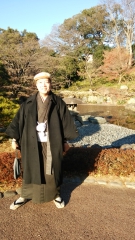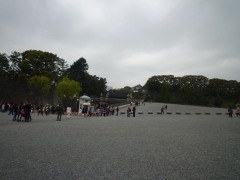15 February 2015
Film"The Butler" Is that a story of Barak Obama?
A story of a man whose father was shot in front of him on the cotton field by a white farmer and later became a house servant of the farmer and then hotel servant and finally was hired by the White House.
It is a fiction but it is based on a real butler who served the White House from 1950's Eisenhower until Reagan's administrations.
It was like Black history of America.
How Black people struggled with the oppression and finally be honoured by the society.
Maybe Obama should have experienced similar things.
In order to change the society, people need to be not only brave but also clever. You cannot just fightback. You might have to get along with majority of the society regardless of their unfair treament of you.
It is a fiction but surprising thing was even in the White House, Afro-Americans were discriminated in salary and positions. It was fixed after Reagan's administration 1980's.
I like that part of America's history, not interested in founding fathers.
It is common with current event happening in Okinawa, Japan.
Because of that, America is no longer my favourite nation.
I can only feel mutuality with the oppressed Afro-Americans who lived in the past.
11:36 Posted in Film, Japan News, Politics, Society, USA issues | Permalink | Comments (0) | Tags: okinawa, racism, history
30 December 2014
Film: 007 "On Her Majesty's Secret Service" Best in the series
I learnt the queen is called "Her majesty" by this film. Just like Emperor is called "His majesty."
The story is just as unrealistic as other films in the series. James Bond went to Switzerland to search for a bad guy who tried to spread poisonous chemical all over the world. While the search, he met a beautiful woman and fell in love with her.
Great thing about this film was that James Bond really fell in love with the woman and lastly married her. That was actually what her father asked him to do in exchange for the information Bond needed. But he really loved her.
The words her father told 007 about his daughter was very memorable. She divorced and lost her child and was in despair. She demanded too much but never met that demand so she could never make herself happy. Right, no one should not demand too much. I recently learnt why I've been not so happy these days by the words.
Interesting fashion was James Bond wore skirt as formal wear at dinner. Actually that was Scottish male formal wear. James Bond was said to be Scottish. It may be common with Japanese. Traditional Japanese male formal wear is skirt as well, actually longer.
The Bond girl in the film seemed very advanced type of character in that era. She skied and drove very professionally and fought against a big man with her hands.
That made me think Bond girls in the series created original image of Charlie's Angels in 1970's. In fact introduction of the film is similar to Charlie's Angels TV shows, shadow image of women's figures.
Unfortunately, Bond girls in the series are killed. At least one in one film. That is the cliche of the series, making viewers sad. But maybe very realistic in that sense.
In this film this cliche was very passionately used. Very cruel way. It happened not in the beginning or in the middle like other films but in the end, which was very dramatic. That really made viewers sad.
That really impress viewers and let them learn how clever the film makers were.
Please see the film and you can share the same opinion with me.
14 November 2014
Deutscher film "Ludwig II" Mad, kind and gay king
Biographic story of Bayern king in 19th century Deutschland (Germany).
A young Ludwig succeeded Bayern crown after sudden death of his father.
Unlike his father, he never liked war and loved music and art. He believed art and music could maintain the peace but at the same time he had to struggle with the reality of the world.
Ludwig admired a opera music composer, Wagner. He became a patron for him. He liked Wagner's most famous opera "Lohengrin." He was a romantist.
But his kingdom faced wars and its sovereignty was weakened by defeats of the wars.
Then he tried to escape from such harsh reality and in his late years he ordered to build his own imaginative castle Neuschwanstein. Neuschwanstain was modeled after the castle on "Loengrin" stage. In Japan it is famous for model of Cinderella castle in Tokyo Disneyland.
I visited Neuschwanstein in April, 1995. Before visiting the castle, I went to Ludwig's home castle nearby. Luckily I was the only visitor so I could speak with the local guide about Ludwig's life. She told me the relationship between his dynasty and commoners was not bad so there was no bloodshed revolts like France. I asked if Ludwig was gay. The guide just laughed. Actually he was and that thing was portrayed in the film.
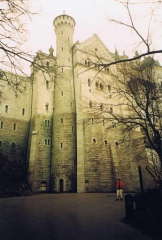
It was of course, a taboo in his society at that time. He struggled with that thing as well.
Lesson of this biography is no one can avoid reality. We all have to deal with it. If you try to escape from it, in the end you will be like Ludwig.
But art and music are really important in our real life and energize us.
Wagner's "Lohengrin" and Neuschwanstein in fact became German's most glorious heritages. Ludwig indeed contributes to his nation even after his death.
00:37 Posted in Art, Deutschland, Film, Music, Politics | Permalink | Comments (0) | Tags: history, gay
31 October 2014
Film "Grace of Monaco" Monaco is like the imperial palace in Tokyo
A biographic story of Grace Kelly who left Hollywood when she was a top star and got married to the Monaco Prince.
I remember TV documentary on her life a long time ago. It was her family's philosophy that leaving the business when he or she is on the top ranking. Not letting anyone see you downgrading.
Indeed, she did.
The film was criticized for historical inaccuracies, so it was noted as fiction based on facts.
But I enjoyed the film because Nicole Kidman who played Grace Kelly was really beautiful.
I first learnt that Monaco's official language was French. The kingdom always had struggles with its fearful neighbor, France.
Maybe getting Grace Kelly married to the royal family was one of biggest strategy to secure their kingdom's soverignty.
Monaco never had military but such a big weapon, the world's most famous celebrity so that no one wanted to destroy the kingdom including her.
A country image is a big thing. Japan has monarchy, emperor Akihito and his family.
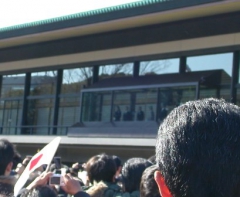
Their residence is size of Monaco. One family occupied huge area in the capital but they contribute a lot to the nation. Former emperor, late Hirohito was about to be accused of war criminal but the U.S. force did not indite him because of fear of rebellion from his people that might make occupation difficult.
The film made me think about Monaco whenever I go to the imperial palace in my city. Actually I am a guide who escorts foreign travelors to the imperial palace. If you want to know more about the tour, please visit this site.
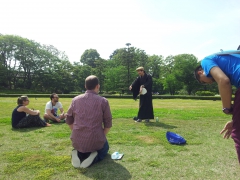
09:46 Posted in Film, France, Politics, Society | Permalink | Comments (0) | Tags: history, emperor, tokyo, documentary






